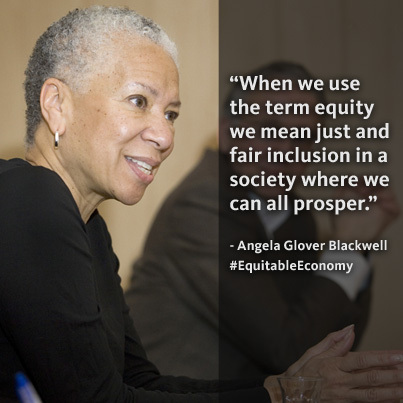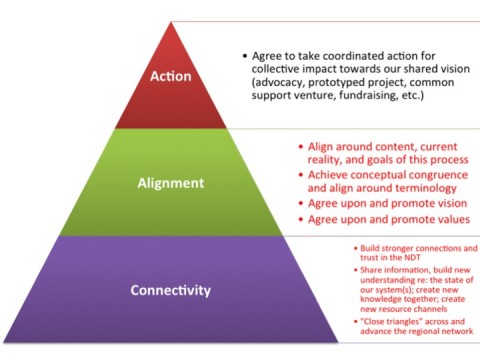Equity for Prosperity

|Image from PolicyLink EquityBlog|http://equityblog.org/2013/02/11/ensure-all-children-can-realize-their-full-potential-in-the-global-economy|

|Image from PolicyLink EquityBlog|http://equityblog.org/2013/02/11/ensure-all-children-can-realize-their-full-potential-in-the-global-economy|
In his post yesterday, Seth Godin offers up sage advice for designers of all kinds, including “social architects” like ourselves who are aiming to create convenings and collaborative processes that bring out the best in people and lead to greater social justice and regenerativity. Among his points: Read More
Leave a commentSome very compelling points are made by Carol Sanford stemming from her work with “responsible businesses” about the importance of how people understand accountability. She cites pscyhological research that suggests that having a sense of personal responsibility for outcomes (or an “internal locus of control”), whether those outcomes are good or bad, equates with higher degrees of happiness, health, and creativity. The converse occurs when people attribute success and failure to outside forces. “Only when people are accountable for their own decisions can they develop the rigor and discipline called for in high-quality decision making,” Sanford writes. Read More
Leave a comment“Structure is purpose expressed through design.”
– Marjorie Kelly, Owning Our Future
Detroit Voices: A Community Calls Out for Change from Phase 4 Media on Vimeo.
The new food movement, which is really several related but distinct movements, is a beacon of hope in this country. You can find evidence of this in many diverse settings, from Flint, Michigan to Northeast Iowa to northern Vermont to Oakland, California. While there are important distinctions in terms of emphasis and core players, one cross-cutting theme appears to be that we must create new structures to better nourish ourselves (calorically, economically, socially) through policy change, different land use patterns, new infrastructure, stronger relationships with ecosystems, new enterprises, and community building. From the growing number of food policy councils, to alternative financing mechanisms, practices like permaculture and agroforestry, and more intentional network building, people are setting the stage for some significant societal shifts. Read More
1 CommentThe following quote appears in a piece written by Olga Bonfiglio on the Common Dreams website, which profiles the remarkable Dr. Grace Lee Boggs. The now 97 year old long-time Detroit political and labor activist, author, and philosopher is the focus of a documentary film in the works called American Revolutionary.
“We are at a stage in human history that is as monumental as changing from a hunter/gatherer society to an agricultural society and from an agricultural society to and industrial society. Read More
1 CommentThis post is not exactly about an insurance policy, at least not in the traditional sense. Picking up on the metaphor of last week’s piece on “Network Gardening,” today we bring focus to how we can protect the early growth of networks for social change. Protect them from what? The temptation to jump to action too quickly, leapfrogging the “problem conversation,” the tendency to want to institutionalize everything (what a friend calls “incorporation fever”), naysayers, exclusionist practices, and the heavy hitters who are used to getting their way. Read More
Leave a comment“We want a system that provides all children regardless of race or economic background with the same opportunities.”
– CT Right From the Start
The video above and words below appear on the CT Right from the Start (RFTS) website, and represent one of the outcomes of the past two years of work of a collaborative multi-stakeholder effort that IISC has been supporting as the lead process designer and facilitator. RFTS runs parallel to the state’s planning initiative to create an early childhood office that consolidates services for children and families. Right from the Start has become an important voice for equity in Connecticut and we are very proud of its stance and our partnership . . . Read More
Leave a commentAn interesting innovation I’ve seen recently in the realm of network building for social change is the creation of what is being called, in one particular system with which I am working, the “Network Support Team.” In the context of what has emerged to this point as an “alignment network” focused on state-wide food system development and addressing community food insecurity, this volunteer team has stepped forward to help “tend to the whole.” It functions much as a good gardener would in her attempts to nurture abundance and flourishing. As this network considers movement into a more action/production-oriented mode, here is how the NST is helping the garden to grow: Read More
4 CommentsLast week I posted an entry on this blog about the myriad ways that people and organizations are engaged in “net work” for social change, by profiling three different initiatives focused on strengthening local food systems and food security. Not only is there a difference in the process, but there is also variation in terms of so-called ends or outcomes. The topic of “planning” has come up quite a bit in these networks and many questions asked about what “a plan” looks like in the context of multi-stakeholder/organizational initiatives tackling complex issues. Once again, the answer is that it depends. In both direct experiences at IISC and in additional research about other initiatives, there is a wide variety around what constitutes a plan for social change. Read More
Leave a commentWith thanks to Jeffrey Cufaude from Idea Architects, who I met on Twitter and from whom I learned about this video, I wanted to pass along this reminder of the power of empathy and the fact that the shoes of another are often our own.
Leave a comment While doing some research on network evaluation techniques, I stumbled on a very helpful and interesting resource entitled “Network Evaluation: Cultivating Healthy Networks for Social Change” by Eli Malinsky and Chad Lubelsky (respectively for the Centre for Social Innovation and the Canada Millenium Scholarship Foundation). While it dates back to 2008 (5 years seeming like eons these days), the paper does a nice job of raising some of the inherent and necessary tensions and balancing acts of engaging in “net work.” I lifted a number of quotes from the paper as a preface to some thoughts about network value, which I laid out according to a framework that I developed (see above) using the work of Peter Plastrik and Madeleine Taylor in their seminal “Net Gains: A Handbook for Network Builders Seeking Social Change.”
While doing some research on network evaluation techniques, I stumbled on a very helpful and interesting resource entitled “Network Evaluation: Cultivating Healthy Networks for Social Change” by Eli Malinsky and Chad Lubelsky (respectively for the Centre for Social Innovation and the Canada Millenium Scholarship Foundation). While it dates back to 2008 (5 years seeming like eons these days), the paper does a nice job of raising some of the inherent and necessary tensions and balancing acts of engaging in “net work.” I lifted a number of quotes from the paper as a preface to some thoughts about network value, which I laid out according to a framework that I developed (see above) using the work of Peter Plastrik and Madeleine Taylor in their seminal “Net Gains: A Handbook for Network Builders Seeking Social Change.”
“We have an obligation to wake others up so that they can share their light.”
– Mayor Cory Booker
It was a privilege to see and hear Newark, New Jersey Mayor and possible Senatorial candidate Cory Booker speak this week. His topic was education, which is near and dear to his heart, and he began by telling a remarkable story about his parents. Booker’s mother and father were both born into relative poverty in the south, and both benefitted tremendously from other people looking out for them, extended family and community members. His father, who was raised by a single mother, was able to attend college in North Carolina because neighbors came together and took up a collection for his tuition. Ultimately both of his parents received a college education and went on to become successful executives at IBM. Read More
1 Comment